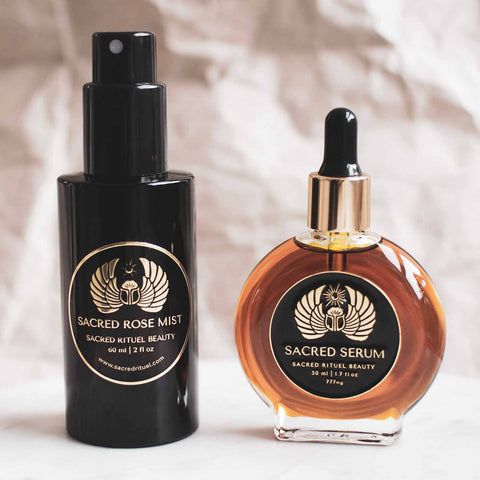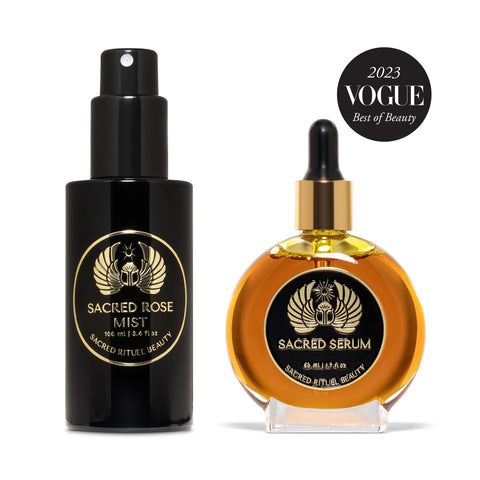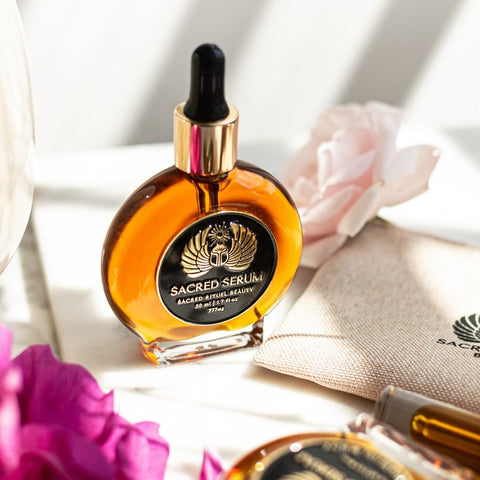Best Serum For Sensitive Skin
Key Takeaways:
- Soothing Sensitivity: Serums designed for sensitive skin are specifically formulated to soothe and reduce irritation, using ingredients that calm the skin and prevent flare-ups.
- Hydration Enhancement: These serums deliver deep, sustained hydration to sensitive skin types, utilizing key hydrating ingredients like hyaluronic acid to maintain moisture levels without causing irritation.
- Barrier Fortification: By strengthening the skin’s natural barrier, serums for sensitive skin help protect against environmental pollutants and stressors, contributing to healthier, more resilient skin.
Products formulated with Arnica to address reduce skin inflammation, bruising, and swelling.

At Sacred Rituel, we utilize the transformative power of nature's most potent ingredients to develop skincare products that are both effective and gentle on sensitive skin. With years of commitment to sustainable sourcing, our serums are crafted to nourish, hydrate, and revitalize while upholding the highest standards of purity and efficacy.
In this article, we will explore why serums are particularly beneficial for sensitive skin, discuss essential ingredients that hydrate and soothe without causing irritation, and provide guidance on incorporating these serums into your skincare routine. Join us as we examine how to improve your skin's health with products specifically designed for the most delicate skin types. We aim to help you enhance your skincare approach with serums that offer profound benefits without compromise.
The Importance Of Choosing The Right Serum
Why Serum Choice Matters For Sensitive Skin
Sensitive skin is highly reactive and can easily become irritated by harsh chemicals and fragrances found in many skincare products. The right serum acts as a soothing agent, providing essential nutrients without the harshness, thereby reducing the risk of inflammation and redness. It also helps in fortifying the skin's protective barrier, enabling it to better withstand environmental and internal stressors. This understanding underscores the importance of selecting a serum specifically formulated for sensitivity.
Ingredients That Make A Difference
Ingredients are the cornerstone of any serum, especially for sensitive skin. Look for serums that contain calming components such as hyaluronic acid, which hydrates without clogging pores, and chamomile, known for its anti-inflammatory properties. Antioxidants like Vitamin C can also be beneficial, but they must be derived from gentle sources to avoid irritation. We'll delve into how each of these ingredients supports sensitive skin health, emphasizing their soothing and restorative properties.
Long-Term Benefits Of Using The Right Serum
Consistent use of the appropriate serum can transform sensitive skin from reactive to resilient. Over time, a good serum will help to maintain a balance in moisture levels, reduce incidents of irritation, and enhance the skin’s natural glow. Moreover, it can diminish the appearance of fine lines and redness, promoting a more even skin tone. We will explore the cumulative benefits of integrating a suitable serum into your daily skincare regimen, emphasizing long-term health and vitality.
Benefits Of Using Serum For Sensitive Skin
Enhanced Hydration
Serums tailored for sensitive skin excel in delivering moisture deeply and efficiently. They utilize ingredients like hyaluronic acid to lock in moisture at multiple skin layers, preventing dryness without overburdening the skin. This deep hydration helps to maintain elasticity and plumpness, thereby smoothing out fine lines and wrinkles that often accompany dry skin.
Reduced Redness And Irritation
Sensitive skin serums are specifically formulated to reduce skin redness and calm irritations. Ingredients such as chamomile and aloe vera provide natural anti-inflammatory benefits, soothing the skin gently. Regular application helps maintain a calm skin surface, significantly reducing flare-ups and discomfort associated with sensitivity.
Strengthened Skin Barrier
Strengthening the skin barrier is critical for sensitive skin to withstand external irritants and pollutants. Serums with niacinamide and ceramides reinforce the skin's natural barriers, enhancing its ability to retain moisture and resist environmental damage. This barrier improvement helps reduce the penetration of irritants that can cause inflammation and sensitivity.
Overall Skin Health Improvement
Consistent use of serums can lead to substantial improvements in the overall health of sensitive skin. They work to normalize skin functions, reduce susceptibility to irritants, and improve texture for a more refined look. The result is healthier, more resilient skin with a visibly enhanced natural glow and reduced signs of sensitivity.
How To Apply Serums For Optimal Results
Cleanse Thoroughly Before Applying
Starting with a clean face is crucial for the effective application of any serum. Use a gentle cleanser suited for sensitive skin to remove dirt and excess oil without causing irritation. This step ensures that the active ingredients in the serum can penetrate the skin effectively and without barriers, maximizing their benefits and reducing the likelihood of irritation.
Use The Right Amount
Serums are highly concentrated, so a little goes a long way. Typically, 2-3 drops are enough to cover the entire face and neck. Dispense the serum onto your fingertips and dab it onto your face, spreading it evenly. This method ensures you don't use too much product, which can overwhelm sensitive skin.
Apply With Gentle Techniques
The application technique is just as important as the serum itself, especially for sensitive skin. Apply the serum using gentle patting motions with your fingertips, which helps increase absorption and reduces the potential for irritation. This method also helps stimulate circulation and can enhance the effectiveness of the active ingredients in the serum.
Layer Wisely
Proper layering is essential for the best results. After applying your serum, allow it to absorb fully into the skin—this usually takes about one to two minutes. Once absorbed, follow up with a moisturizer to seal in the serum’s benefits and add an extra layer of protection, ensuring that the skin remains hydrated and nourished throughout the day.
Signs You Need To Switch Your Serum
- Increased Skin Sensitivity or Irritation - If you notice that your skin becomes more sensitive or irritated shortly after starting a new serum, it may not be suitable for your skin type. Signs like redness, itching, or burning are clear indicators that the product might be too harsh for your sensitive skin.
- No Improvement or Worsening Condition - A serum should show positive results, like improved hydration or reduced redness, within a few weeks. If your skin condition does not improve or worsens, it might be time to consider a different formulation that better addresses your skin’s needs.
- Breakouts or Congestion - While serums are generally light, some formulations might still clog pores, especially if they contain comedogenic ingredients. If you experience new breakouts or your pores appear more congested, this could be a sign that your serum is not right for you.
- Product Pilling or Incompatibility with Other Skincare - If your serum does not absorb well into the skin and instead pills or reacts when layered with other products, it may not be compatible with your skincare routine. A good serum should seamlessly integrate without causing issues with other products you use.
How Environmental Factors Affect Sensitive Skin And The Role Of Serums
Impact Of Pollution And Urban Environments
Sensitive skin is especially at risk in polluted, urban areas where contaminants can penetrate the skin, leading to oxidative stress and inflammation. Antioxidant-rich serums can form a protective barrier, guarding against pollutants while healing the skin from environmental damage. These serums support skin’s cellular repair processes, vital for combating the signs of aging caused by urban living. Regular application can significantly reduce the visible effects of environmental aggressors.
Effects Of Seasonal Changes
The changing seasons bring shifts in humidity and temperature that can strip sensitive skin of its natural oils, causing dryness and flakiness. Serums enriched with hyaluronic acid and ceramides can provide deep hydration and reinforce the skin's barrier against the cold in winter and heat in summer. This adaptability helps to stabilize skin condition throughout the year, preventing seasonal dermatitis and other skin irritations that are common with sensitive skin.
Sun Exposure And Sensitive Skin
For sensitive skin, sun exposure can be particularly harmful, leading to exacerbated sensitivity and accelerated aging. A serum with SPF or designed for post-sun care can mitigate these effects by soothing and repairing the skin. Ingredients like aloe vera and Vitamin E can reduce inflammation and support the skin’s healing from UV damage, making them essential in serums for day-to-day protection. Ensuring that these protective ingredients are part of your daily skincare can drastically reduce UV-related issues.
Role Of Serums In Environmental Protection
Serums serve an essential role in not just nourishing the skin but also protecting it from everyday environmental challenges. By forming a shield against pollutants and UV rays, serums enhance the skin's defensive capabilities, enabling it to better withstand environmental stresses. Regular use of targeted serums can lead to healthier, more resilient skin, less prone to reactions and more capable of maintaining its balance in the face of environmental changes.
Read also:
- Why Is My Skin So Dry Even When I Moisturize?
- The Ultimate Guide To Skincare For Sensitive Skin
- Managing Acne-Prone Skin: Expert Advice And Solutions
Frequently Asked Questions About Serum For Sensitive Skin
What are the key benefits of using a serum for sensitive skin?
Serums for sensitive skin deeply hydrate, soothe irritation, and strengthen the skin's natural barriers. These benefits help reduce sensitivity and improve skin resilience. Regular use can also enhance the overall texture and appearance of the skin.
How often should you apply serum to sensitive skin?
It is recommended to apply serum twice a day, after cleansing and before moisturizing. Consistent application in the morning and evening ensures optimal benefits. This routine helps maintain continuous hydration and protection for sensitive skin.
Can serums for sensitive skin reduce the appearance of fine lines?
Yes, many serums for sensitive skin are formulated to target fine lines by boosting hydration and elasticity. These serums can smooth out fine lines over time without irritating the skin. Regular use is key to seeing significant improvements in skin texture.
Are there specific ingredients to look for in serums for sensitive skin?
Ideal serums for sensitive skin should include hyaluronic acid, niacinamide, and ceramides. Ingredients like chamomile and aloe vera are also beneficial for their soothing properties. These components help calm the skin while providing necessary hydration and protection.
Is it possible to use other skincare products alongside sensitive skin serums?
Yes, you can integrate sensitive skin serums with other skincare products. It's important to allow the serum to fully absorb before applying additional products like moisturizers. This layering enhances the efficacy of your skincare routine without overwhelming sensitive skin.
What signs indicate a serum might be wrong for my sensitive skin?
Signs such as increased redness, irritation, and breakouts suggest a serum may not be suitable. If your skin feels overly sensitive after application, consider switching products. Always monitor your skin's reaction when trying a new serum.
How do serums help protect sensitive skin from environmental damage?
Serums containing antioxidants protect sensitive skin against pollutants and UV damage. These formulations help to mitigate oxidative stress and support skin repair. Using such serums daily forms a defensive barrier that enhances skin resilience.
Can changing seasons affect the efficacy of serums on sensitive skin?
Seasonal changes can impact the effectiveness of your skincare products. Adapting your serum choice to include more hydrating or barrier-strengthening ingredients as seasons change can help maintain skin balance. This ensures that your skin remains protected and nourished throughout the year.
What should I do if my skin reacts negatively after using a serum?
If you experience negative reactions like increased sensitivity or irritation, stop using the serum immediately. Consult with a dermatologist to identify a more suitable product. It’s important to tailor your skincare to your skin’s specific reactions and needs.
How does the right serum improve long-term health of sensitive skin?
Consistent use of a well-suited serum promotes a balanced, resilient complexion. It helps sensitive skin become less reactive over time by strengthening the skin barrier and maintaining hydration. Long-term benefits include a more even skin tone and reduced sensitivity.


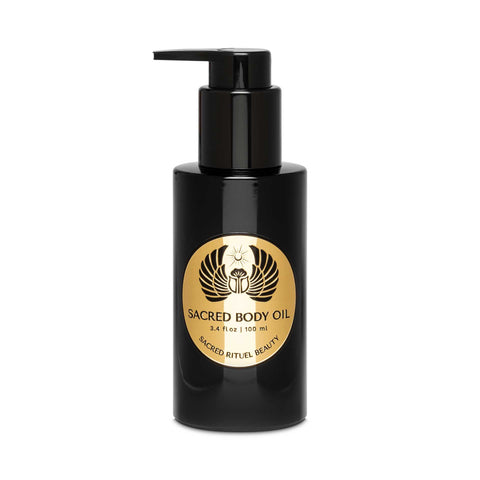
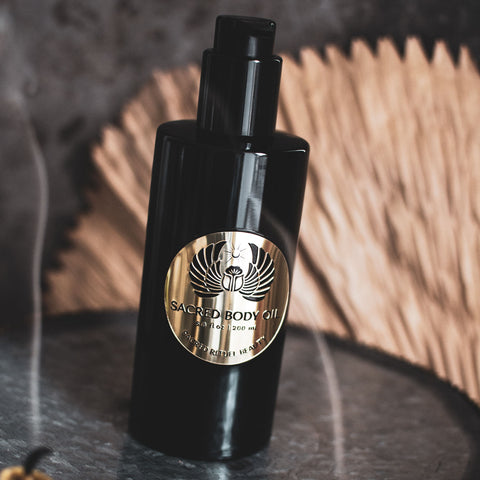
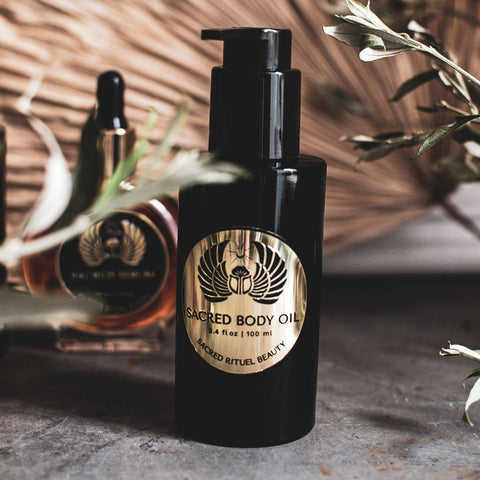

All Day Glow Essentials
Free Shipping on orders over $90
FREE Shipping on orders over $90 and $7 flat rate on all other orders (USA).
See our shipping policy.
Auto Delivery w/ a Subscription
Ensure you ALWAYS have a steady stream of SACRED RITUEL on hand!
Details in our subscriptions page.
No Hassle 30-day Returns
Try SACRED RITUEL for 30 days and send it back for a full refund if it doesn't completely meet your expectations.
Details in our return policy.
SACRED RITUEL is
High potency all organic skincare
Newsletter
Stay connected on wellness tips, exclusive sales and events!

